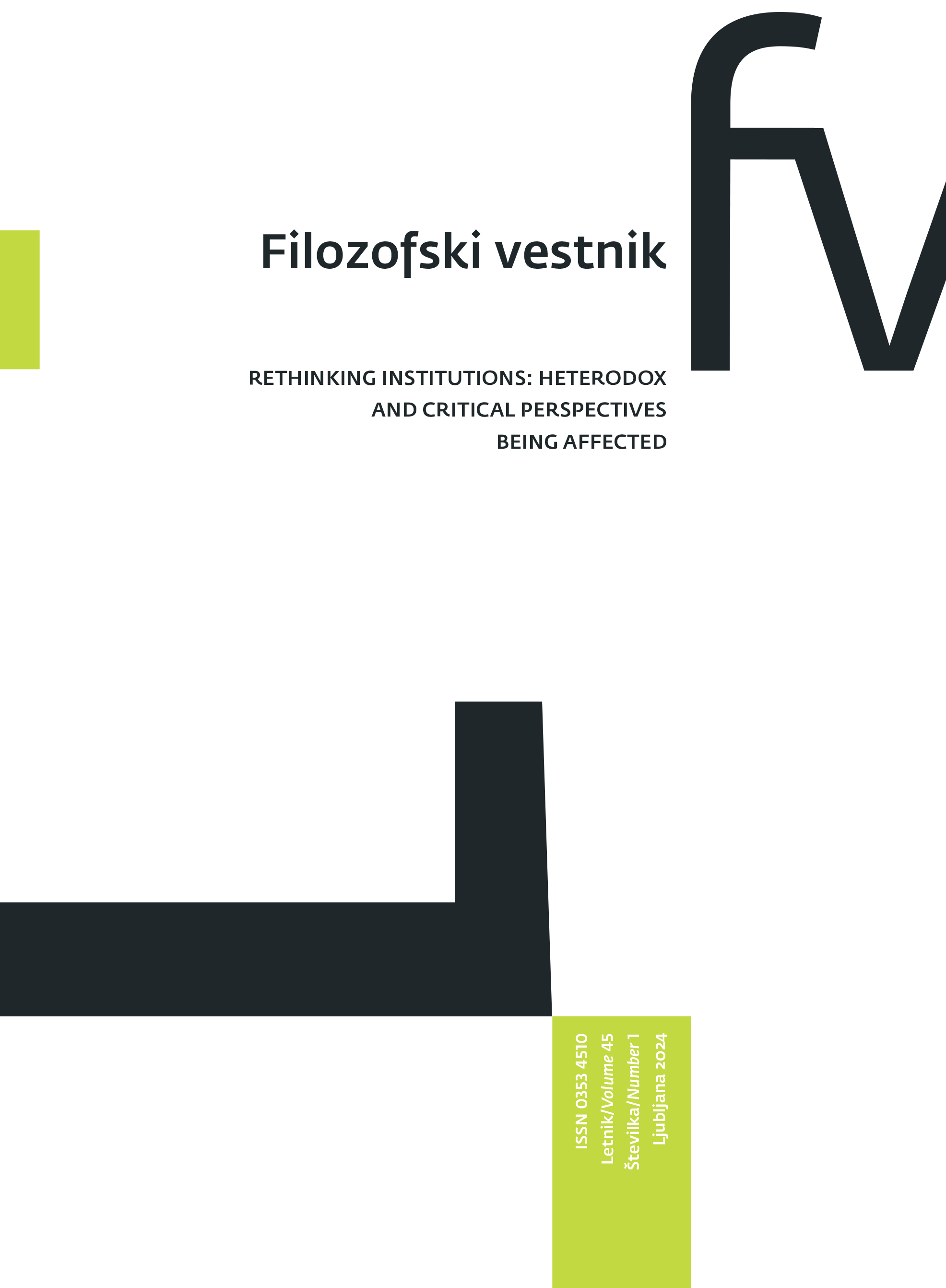Institutions, History, Subjects
DOI:
https://doi.org/10.3986/fv.45.1.04Keywords:
institutions, Law, subjectivity, history, event, Giordano BrunoAbstract
Recent years have seen an immense upsurge in developing the notion of institution with the aim of updating and reconfiguring its conceptualisation to make it correspond to present times. The stakes are high as the current Western institutional framework struggles to ensure its historical continuation—conceived broadly as political, economic, social, scientific, artistic, and other institutions—as the predominant global dispositive. In the article, we first review the current most significant orientations and disciplines that focus on institutions and proceed with a critical assessment of relevant events. In the second part, we question the subjective process and subjectivation of an institutional framework. If we reject the linguistic, empirical, or hermeneutic approaches, how can we capture the dynamics of change in a framework? What indicates that a subjective process is taking place? We draw on the cases of St. Paul and Giordano Bruno to illuminate the Law’s historical repetition through cumulative cultural growth in re-inscribing the subjectivization of faithful and enduring—i.e. universalist—operations of rupture and dispute leading to a Decision against reigning particularisms of institutional setups.
Downloads
References
Agamben, Giorgio. The Kingdom and the Glory: For a Theological Genealogy of Economy and Government. Translated by Lorenzo Chiesa and Matteo Mandarini. Stanford: Stanford University Press, 2011.
Agamben, Giorgio. Potentialities: Collected Essays in Philosophy. Edited and translated by Daniel Heller-Roazen. Stanford: Stanford University Press, 1999.
Agamben, Giorgio. State of Exception. Translated by Kevin Attell. Chicago: University of Chicago Press, 2005.
Agamben, Giorgio. The Time That Remains: A Commentary on the Letter to the Romans. Translated by Patricia Dailey. Stanford: Stanford University Press, 2005.
Arnould, Jacques. Giordano Bruno: Un génie, martyr de l'Iinquisition. Paris: Albin Michel, 2021.
Badiou, Alain. Conditions. Translated by Steven Corcoran. London: Continuum, 2008.
Badiou, Alain. Saint Paul: The Foundation of Universalism. Translated by Ray Brassier. Stanford: Stanford University Press, 2003.
Badiou, Alain. Theory of the Subject. Translated by Bruno Bosteels. London: Continuum, 2009.
Balibar, Étienne. Equaliberty: Political Essays. Translated by James Ingram. Durham: Duke University Press, 2014.
Castoriadis, Cornelius. The Imaginary Institution of Society. Translated by Kathleen Blamey. Cambridge: Polity, 1997.
Diaconescu, Răzvan. Institution-Independent Model Theory. Basel: Birkhäuser, 2008.
Durkheim, Émile. The Rules of Sociological Method. Edited by Steven Lukes. Translated by W. D. Halls. New York: Free Press, 1982.
Esposito, Roberto. Institution. Translated by Zakiya Hanafi. Cambridge: Polity, 2022.
Galbraith, John Kenneth. Economics and the Public Purpose. Harmondsworth: Penguin, 1973.
Goguen, Joseph, and Rod Burstall. “Institutions: Abstract Model Theory for Specification and Programming.” Journal of the Association for Computing Machinery 39, no. 1 (January 1992): 95–146. https://doi.org/10.1145/147508.147524.
Guala, Francesco. Understanding Institutions: The Philosophy and Science of Living Together. Princeton: Princeton University Press, 2016.
Guéry, Alain. “Institution: Histoire d'une notion et de ses utilisations dans l'histoire avant les institutionnalismes.” Cahiers d'économie Politique 44, no. 1 (2003): 7–18. http://doi.org/10.3917/cep.044.0007.
Hodgson, Geoffrey M. “What Are Institutions?” Journal of Economic Issues 40, no. 1 (2006): 1–25.
Lawson, Tony. “What Is an Institution.” In Social Ontology and Modern Economics, edited by Stephen Pratten, 553–77. London: Routledge, 2015.
Maifreda, Germano. The Trial of Giordano Bruno. Translated by Paul M. Rosenberg and Loretta Valtz Mannucci. New York: Routledge, 2022.
Malabou, Catherine. What Should We Do with Our Brain? Translated by Sebastian Rand. New York: Fordham University Press, 2008.
Marcuse, Herbert. Negations: Essays in Critical Theory. Translated by Jeremy J. Shapiro. London: MayFly Books, 2009.
Marx, Karl. Capital: A Critique of Political Economy, Volume One. Translated by Ben Fowkes. Harmondsworth: Penguin, 1993.
Mauss, Marcel, and Paul Fauconnet. “Sociologie: Objet et méthode.” In Cohésion sociale et division de la sociologie, ed. Victor Karady, 139–77. Vol. 3 of OEuvres. Paris: Minuit, 1969.
North, Douglass C. Institutions, Institutional Change and Economic Performance. Cambridge: Cambridge University Press, 1990.
Riha, Rado. “Kako je mogoče misliti singularno univerzalno?” Filozofski vestnik 20, no. 1 (1999): 193–203.
Yates, Frances A. Giordano Bruno and the Hermetic Tradition. London: Routledge, 1964.
Downloads
Published
How to Cite
Issue
Section
License
Copyright (c) 2024 Authors

This work is licensed under a Creative Commons Attribution-ShareAlike 4.0 International License.
Authors guarantee that the work is their own original creation and does not infringe any statutory or common-law copyright or any proprietary right of any third party. In case of claims by third parties, authors commit their self to defend the interests of the publisher, and shall cover any potential costs.
More in: Submission chapter





